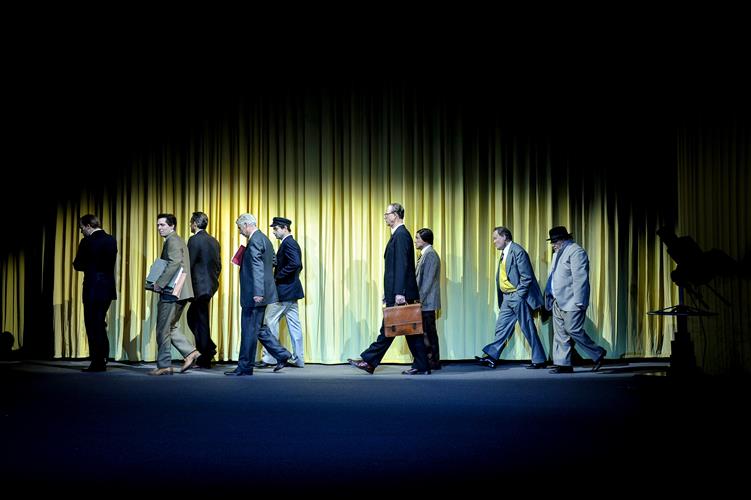
Willy Brandt, Germany’s first – malicious tongues might say only – left wing post-war chancellor was born in 1913. One hundred years later, the Deutsches Theater in Berlin showed the play “Democracy,” in which Michael Frayn tells of the rise and fall of one of Germany’s most important political figures of the 20th century. The news of this event eventually reached the ECLA microcosm and Ewa Atanassow’s class on ‘Democracy – Ancient and Modern’ deliberated whether to attend a showing or not. Following due legal process, a vote was held and it was the unanimous decision of the class to enrich the seminar experience through a visit to the theatre on March 22nd 2013.
Quite opposed to such consensus, “Democracy” depicted a tangle of conflicting parties and interests that makes the very thought of unanimity appear an idealistic illusion. Socialists, liberals and conservatives were lurking, waiting only for the other to make a misstep, all against the backdrop of constant tensions between the East and the West during the Cold War. At the heart of these sometimes subtly fought, sometimes almost violent, but always intense power games we found two characters who, at first glance, could not be more opposed. On the one hand Willy Brandt, a charismatic leader, the ever rising star of his party, a womanizer, a German Kennedy, chancellor of West Germany. On the other hand, the young socialist Günther Guillaume, inconspicuous, zealous, working hard for the party yet remaining humble in his personal life – and an agent of the Stasi, East Germany’s infamous secret service. Through an unforeseen series of events, Guillaume finds himself in the position of Brandt’s closest assistant. His officials in the GDR anxiously await his reports on the chancellor’s behaviour. Brandt’s Ostpolitik promises policies of reconciliation with the East, but can he really be trusted? The characters get drawn into a dangerous dance on the slippery floor of Cold War politics. Guillaume sympathises with Brandt’s policies of easing the East-West tensions. As the years go by and he builds his life around the chancellor’s political campaigns, he suffers with Brandt when he is threatened by a vote of no-confidence, he rejoices in Brandt’s re-election, and he begins to question the bounds of old loyalties. At the same time, Brandt’s relation to his closest allies becomes more and more pervaded by the undertones of cool professionalism and the spectator wonders whether there ever was a whole-hearted idealism and enthusiasm that seemed to have brought them together in the beginning. The play finds its climax when Guillaume is unmasked as a Stasi spy. The media start to investigate the private life of Brandt and he eventually decides to step down in order to escape the pressure and to limit the damage for his party. His allies only half-heartedly try to stop him. At the end Brandt and Guillaume are both alone, and maybe they have been alone all along.
The play is dramatic in a colloquial sense; it is epic in a theatrical, Brechtian sense. Hence, the name “Democracy,” as the play does not simply portray a single case of political scheming, not just the choppy career of a charismatic leader, but it raises general questions about the democratic system. Direct interaction with the audience creates an alienating effect and is supposed to make the spectator question the characters, their motives, and the play itself. There is, for example, the question about the relation between the public sphere and the private sphere of people, especially those who hold power and office. Brandt leads a loose life, he has numerous affairs, and his alcohol consumption is excessive, yet it is only in the aftermath of the political scandal regarding Guillaume that his private life is questioned. Other questions relate to the role of populism in democracies. Michael Frayn uses German Schlagermusik (as well as German versions of songs by the Rolling Stones, Cat Stevens and Simon and Garfunkel) to describe his characters, giving the star politician Willy Brandt a rock star aura, and thus playing on the complexity of his perception by the public. At times, the mostly cheerful songs made the play seem like a musical, but the characters also reflected back on the music and put the shallow love songs in a political context, thus giving them unexpected and often intriguing twists. This ingenious move, albeit taken to the limit of endurability, blurs all lines and often leaves the audience puzzled by the ambiguity between a politicized pop culture and dramatized politics.
The dramatic music, apart from its use as a tool for alienation– one notes the irony! -, made the play epic in yet another way: although a mere hundred pages long in script, it lasted for the epic length of over three hours. When the doors were open again we left this somewhat bizarre and other-worldly sphere of the Deutsches Theater into the heart of Berlin, not far from all these contemporary centres of power whose influence nowadays ranges far beyond the borders of Berlin, of Germany, even of Europe. Through the centre of the city, we made our way to another little protected sphere, the ECLA campus, where we will continue to play democracy in our class and other assemblies of ECLA people. In the sometimes forlorn bubble of Pankow, it is easy to forget about the subtle storms raging outside behind cabinet doors and parliament walls. Sometimes democracy here seems like a game we play from time to time and silly love songs seem to be, well, just silly love songs. But a trip like this brings back to our mind the forces and powers surrounding us, making us listen to another rhythm: the constantly beating pulse of power at the heart of Berlin.
